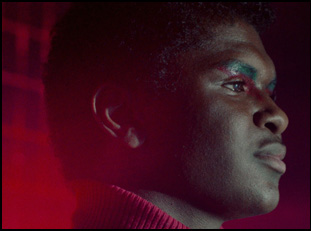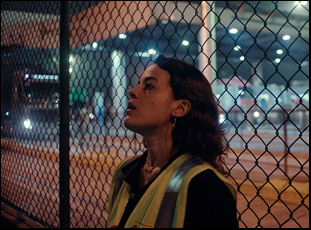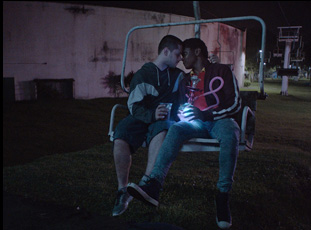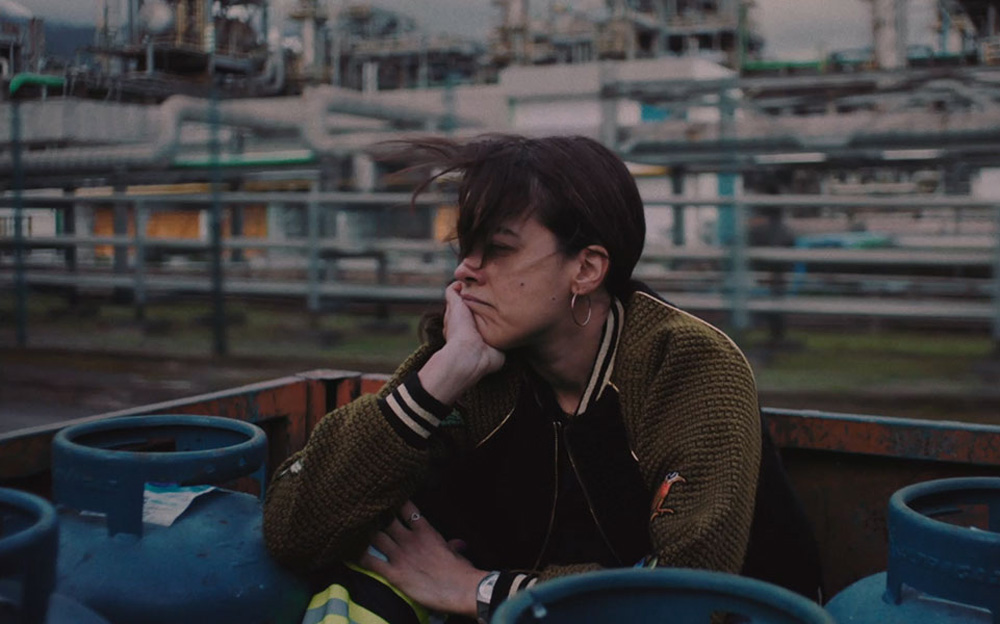As a tollbooth collector, Suellen (Maeve Jinkings) may be in charge of who passes onto the stretch of road she’s responsible for in Brazil, but in her life in “Toll,” there’s considerably less control. Her boyfriend Arauto (Thomas Aquino) shows up when he pleases, likely mixed up in business that he’d rather not report, and her teenage son Tiquinho (Kauan Alvarenga) often sequesters himself in his room, trying to scare up followers and dollars on his TikTok where he lip-syncs old American soul standards, with the two not fond of each other when they cross paths in the dining room of Suellen’s humble apartment. She probably shouldn’t care about the likelihood that Tiquinho is gay, especially in light of all her other concerns, but when her co-worker Telma (Aline Marta Maia) tips her off to the arrival of Pastor Isaac, a gay conversion specialist in the field of “bioenergenetic resignifcation,” there seems to be an opportunity to feel as if she’s getting back on track even as she has doubts if she’s putting her son on the wrong one, if she could only afford the $1650 for the pseudo-religious service.
“Toll” is the marvelous second film from Carolina Markowicz, only a year removed from her deviously delightful feature debut “Charcoal,” and she again shows a genius for social satire and low-level criminal schemes as she follows up the tale of a family that takes in a criminal to help pay their bills with this darkly comic thriller in which two cons end up supporting one another as Suellen looks to pay for her son’s treatment by tipping off Arauto to drivers who have the misfortune of passing through her lane with pricey goods in their backseat. In the factory town where the air is filled with pollution, Markowicz finds something even more corrosive in the equally pervasive political and religious conservatism that runs through the region and in training her lens on Suellen, a working class mother who sees little chance for upward mobility in her own lifetime, she captures a generational tragedy as she misguidedly tries to improve the life of her son, dirtying her hands even before dabbling in unlawful behavior.
When showing an absurd situation for what it is, Markowicz nearly put herself in one, filming “Toll” and “Charcoal” back-to-back after spending the better part of a decade plotting and planning them, and while the sweat of a grueling production schedule doesn’t show up on screen, the films look like the work of a well-oiled machine as the director carries over much of her cast and crew from one film to the next and demonstrates a distinctive and daring voice that has only gotten bolder with experience. Already selected to accept this year’s Toronto Film Fest Emerging Talent Award, Markowicz is making her triumphant return to Canada and graciously spared a few minutes to talk about “Toll,” the endurance test of delivering two films to TIFF in consecutive years and the X-rated talk of production meetings involving the silly gay conversion therapy.

Yeah, it does have the same actor, but it’s a very different story and when I was doing the short, I wasn’t thinking about the feature. I do have some influences by the short film in terms of tone and especially not making the character a victim all the time and it’s quite crazy to see [Kauan], the boy, when we were starting doing the feature film, how much he had grown up [since doing the short in 2017]. This was something really interesting to follow his development as an actor and as a human being.
It seems like an exciting opportunity. What was it like to engage with him through those formative years?
Like all the kids, that’s always a bit more complicated than with adults. I’m very fascinated by it because working with kids brings the unexpected and the unplanned, and I love that so much because I believe that the world and that the film itself, it tells you what to do and what choices to make. When you work with kids, it’s not artificial, it’s something that just happens and when you get it with kids is so magic because they are very free. I very much enjoy that and it’s funny because even though Kauan was grown up when we shot “The Orphan,” he was 13 and now he’s 18, he [still] has this childish soul and that freshness that I enjoy very much when working with kids.

No, I almost had a heart attack. [laughs] Not easier at all. It was very hard because we shot [“Toll”] right after “Charcoal,” and I had been developing both films for seven years, so I had been working a lot on them — everything in the script and related to the choices of direction. But having these two shoots so close, they had four months [in between], so it was really insane for me, in terms of my health because I was tired. But I was so excited [to be making both], and I was so eager to do this story and I felt it was so important that I needed to do that, and it gave me a lot of strength to do. The crew and the cast was also so excited, but in terms of normality of a human being doing two films in such a short amount of time, I would tell you that it was quite hard.
You pulled it off and something fascinating about looking at them side-by-side is to realize they’re in completely different environments from one another.
That was great. As I said, I had been thinking about those films for many years. “Charcoal” was the first that I started developing 2014, and then I started developing “Toll” in 2017 and what you said is interesting because at the same time, this city [in “Toll”] feels a bit like countryside because it’s actually very close to the beach. But ”Toll” was way more complicated because I had a lot of locations, and in “Charcoal,” we were more concentrated in the family’s home, so it makes things much easier for production because you don’t need to move the crew so you can have more time to shoot. I needed to be very fast at some points, and it was really demanding for me to figure out how I would do it with the amount of time and budget we had to shoot it all.
The production meetings must’ve been fascinating, particularly figuring out this absurd “biogenetic resignification” program. What was it like talking to the prop department or graphic designers about this entire crazy process?
It was crazy because you would say something serious like, “Please send me the the anus PowerPoint now.” We were not even thinking about what we were saying – everything was stated as if it was normal. It was so funny and one of the days that we were shooting, one of the extras came to me and asked me if I was a biologist because of the [religion’s mention of] bacteria, and I’m like, “Oh my god, no, no. Please, this doesn’t make sense at all.” But a lot of pastors do say things about that. It doesn’t make as much sense as [it does for] a lot of people who portray this conversion treatment. But at the same time, it was fun. The parts that we shot in the church were very fun.
Was it much of a search for that church? It was an amazing location.
Yeah, many of the churches here in Brazil are in huge places, but a bit more raw. They have these white plastic chairs and this little stage where the the preacher [stands] and shouts everything, so I wanted to do a bit differently, [having] this rawness, but at the same time it had to be different, as if it was like a marketing thing [where] this guy comes from abroad and he is modern and he’s young. He has all this coach talk that I find very funny as well, and the location was actually a club, not a nightclub, but this place that I thought was fascinating. The same place where they are sitting outside with the mermaid, which is so weird, I found very suitable for the place where this could happen.

You’re returning to Toronto triumphant, not only in terms of coming back a year after “Charcoal,” but they’ve already announced you’re winning a prize, the Emerging Talent Award. What’s it like going back?
Going back to Toronto itself, it’s already amazing and the award was an incredible surprise. I wasn’t expecting it at all. I was so honored and it moved me so much. I’m so grateful to Toronto International Film Festival for being supportive of my voice as an artist for more than 10 years now and it has changed my career and my life completely since I started having my films in Toronto. I have met a lot of people and have had a lot of opportunities, so I’m so grateful and proud to be part of the Toronto family.
“Toll” will screen at the Toronto Film Festival on September 8th at 6:30 pm at the TIFF Bell Lightbox 2, September 9th at 9:45 pm at the Scotiabank 14 and September 16th at 12:45 pm at the Scotiabank 14.




